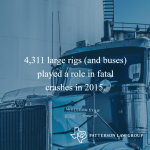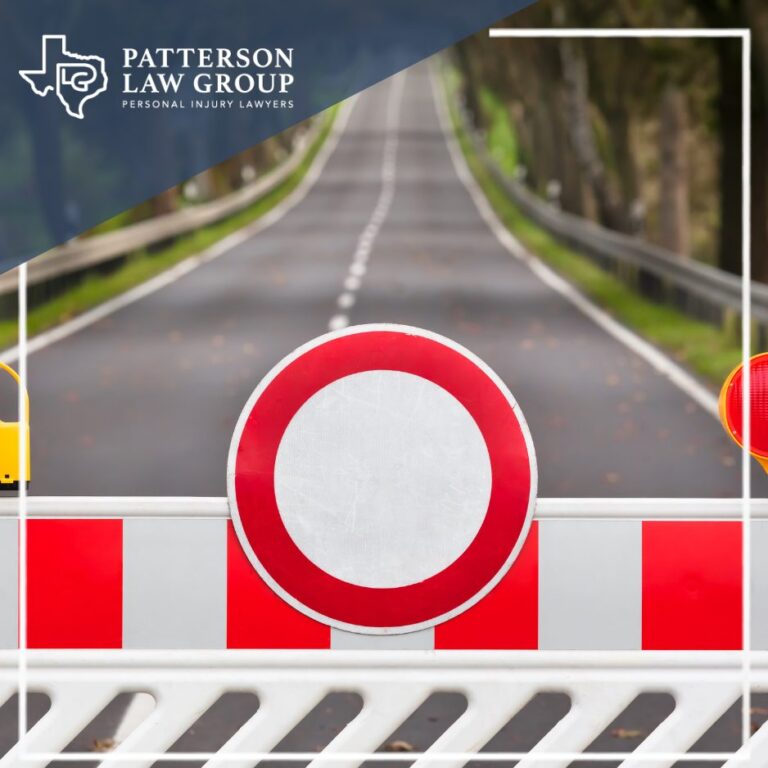Even though the number of fatalities due to vehicle crashes is rising in the United States, the trucking industry is asking Congress to approve new, heavier trucks for use on our nation’s roadways. Are these new-generation trucks safe to be on our streets and highways? Or will they lead to more fatal crashes with automobiles? Truckers and their employers think there’s only gain to be seen from allowing trucks with a higher weight limit to move heavier loads on our roads. With the trucking industry and shippers pulling for machinery of more magnitude, there needs to be a serious conversation about the safety of larger rigs – in particular a truck driver’s ability to handle them.
Large Trucks Contribute Significantly To Fatal Crashes

The Federal Motor Carrier Safety Administration (FMCSA) report titled Large Truck and Bus Crash Facts 2015 reveals that 4,311 large rigs (and buses) played a role in fatal crashes in 2015. This is an 8 percent increase from the previous year.
Speeding, trucker fatigue, and the challenge of stopping a heavy vehicle contributed to the disproportionate number of trucks involved in the fatal crashes. Many of the crashes were rear-end collisions, which were caused when large trucks came up upon stalled automobiles.
Common Causes for Large Truck Crashes
Tractor trailers and other large vehicles can pose a significant threat to cars. Further, many truck accidents occur due to drivers not paying attention to the road, failing to adjust their speed to weather or road conditions, or operating defective vehicles. In addition, truck companies may be responsible for accidents if they fail to ensure that their drivers are adequately trained.
Other drivers can also contribute to truck accidents by following semi-trucks too closely, making sudden lane changes, or passing trucks on the right. Therefore, it is essential for all motorists to be aware of the potential risks and to take appropriate precautions when sharing the road with large vehicles. Some of the most common causes of large truck accidents include:
- Severe weather. Hazardous weather can play a role in commercial truck accidents. For example, accumulated snow, driving rain, or heavy ice can cause a driver to lose control of their vehicle. These conditions are more likely to cause an accident when the operator fails to drive safely.
- Driver error. Truck driver error is one of the most common causes of truck collisions. Truck drivers’ mistakes can vary, from driving too fast to failing to yield the right-of-way.
- Regulation violations. Many trucking regulations are designed to protect the public from dangerous accidents. Unfortunately, accidents can happen when drivers fail to comply with these regulations. For example, most truckers may drive a maximum of 11 hours after 10 consecutive hours off duty. If they violate this, they run the risk of drowsy driving which is dangerous.
- Failure to train truck drivers. It is also possible for the trucking company to share in the liability for an accident. These companies have an obligation to ensure their drivers are appropriately trained. If they fail to do so, they could be at fault for any accidents that occur.
- Negligent hiring. Trucking companies could also be at fault in a truck accident if they negligently hire a dangerous driver. This could involve hiring someone without proper licensing or with a history of drunken driving.
Congress Previously Rejected a Request for Larger Trucks on the Road
In 2015, Congress rejected a request to allow heavier trucks on the road. Their rejection defeated an amendment that would permit rigs as heavy as 91,000 pounds to be on our country’s interstate highways. The weight limit was to be an increase from the 80,000-pound ceiling put into effect in 1982.
Trucks that weigh 80,000 pounds are 20 to 30 times heavier than the average car already. Additionally, they take 20 to 40 percent more distance to stop. The distance required for a 91,000-pound truck to stop is considerably longer than that of a truck within the current weight limit. Rigs carrying loads that are near in weight to the current federal limit are already 2 times more likely to play a part in a fatal crash than trucks weighing less than 50,000 pounds.
Proponents Argue Allowing Heavy Trucks Means Fewer Trucks on the Road
Those in favor of increasing the weight limit for big rigs on the road say that the higher cap will result in fewer trucks on our highways, and therefore fewer crashes. But, in the past, we’ve seen that truck weight limit increases just create freight diversion and more trucks on our roads.
It’s important to also note that heavier trucks and more trucks put significant strain on our infrastructure, throughout the country and right here in Texas where we’re trying to protect drivers. Poor infrastructure – potholes and damaged roads – leads to more vehicle crashes. It’s quite simple, we think. Bigger trucks mean bigger consequences related to serious vehicle crashes.
The FMCSA has been a supporter of safety proposals like those related to the use of electronic log devices, which they say would curb truck-related crashes. It also advocates for speed limiters and other safety measures. Currently, large truck drivers are required to take the following safety precautions:
- Log all driving hours
- Log all resting hours
- Comply with all FMCSA regulations governing hours of operation
However, it’s quite easy for truckers and trucking companies to falsify this information. There is currently support for an FMCSA proposal that requires trucking companies to outfit their rigs with electronic logging devices. The FMCSA speed limiter proposal that’s being discussed would also hopefully reduce the number of accidents involving trucks.
Before we see new, larger trucks on the road, we need a requirement in place for all rigs to be equipped with standard safety equipment. Then, we can weigh the pros and cons of heavier loads.
If you’ve been in an accident involving a truck, contact Patterson Law Group. Fill out the form on the bottom of this page and one of our attorneys will be in touch with you promptly.





